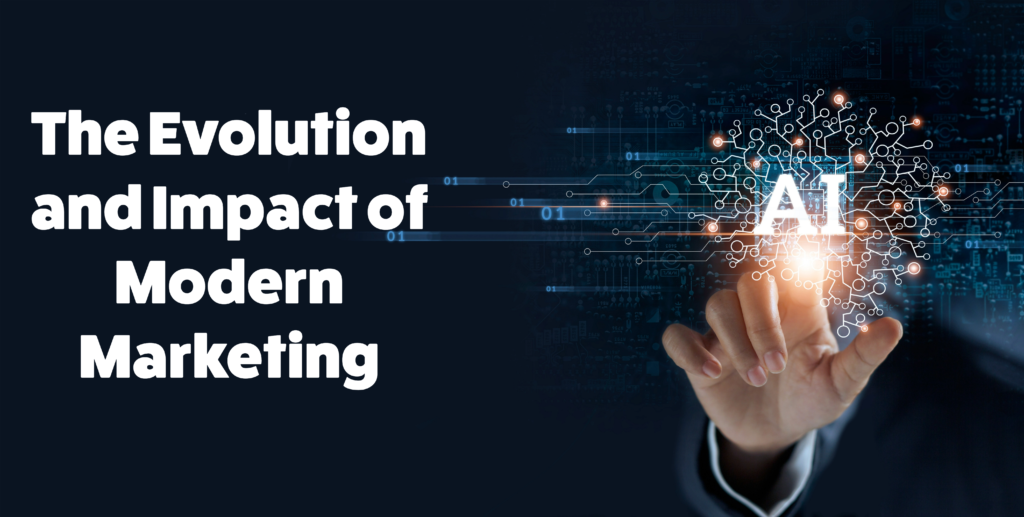Contents
Introduction
Marketing, the art and science of connecting with consumers, has witnessed a remarkable transformation over the past few decades. From traditional advertising methods such as print, radio, and television to the current digital era dominated by social media, data analytics, and artificial intelligence, the field of marketing has expanded and evolved significantly. This article delves into the evolution of marketing, the impact of modern techniques, and the strategies businesses can employ to stay competitive in an increasingly dynamic market.

The Evolution of Marketing
Early Days: Traditional Marketing
Marketing’s origins can be traced back to ancient civilizations where merchants used word-of-mouth and simple signage to attract customers. However, the field as we know it began to take shape during the Industrial Revolution. Mass production created the need for mass consumption, and businesses began to invest in advertising to reach broader audiences.
Print Advertising: Newspapers and magazines were the primary channels for advertising in the early 20th century. Businesses relied on compelling copy and eye-catching visuals to capture the attention of readers.
Radio and Television: The advent of radio in the 1920s and television in the 1940s brought new opportunities for marketers. These mediums allowed for audio-visual storytelling, making advertisements more engaging and memorable. Iconic commercials and jingles from this era still resonate with audiences today.
The Digital Revolution
The late 20th century marked the beginning of the digital revolution, fundamentally changing the landscape of marketing.
The Internet: The rise of the internet in the 1990s opened up a new world of possibilities. Websites became essential for businesses, offering a digital storefront accessible to a global audience. Email marketing emerged as a cost-effective way to reach consumers directly.
Search Engines and SEO: Search engines like Google revolutionized how people found information online. Search engine optimization (SEO) became crucial for businesses to improve their visibility in search results. This era saw the rise of content marketing, with blogs and articles designed to attract organic traffic.
Social Media: The 2000s brought social media platforms such as Facebook, Twitter, and Instagram. These platforms allowed businesses to engage with consumers on a more personal level, fostering community and brand loyalty. Social media marketing became a vital strategy for reaching younger, tech-savvy audiences.
Mobile Marketing and Apps
With the widespread adoption of smartphones in the 2010s, mobile marketing gained prominence.
Mobile-Friendly Websites: Ensuring websites were mobile-friendly became essential as more people accessed the internet via smartphones. Responsive design allowed websites to adapt to different screen sizes, enhancing user experience.
Mobile Apps: Apps offered businesses a direct channel to engage with consumers. Brands developed apps for shopping, entertainment, and customer service, creating new opportunities for personalized marketing.
Data-Driven Marketing and AI
The ability to collect and analyze vast amounts of data has transformed marketing once again.
Big Data and Analytics: Marketers now have access to unprecedented amounts of data on consumer behavior and preferences. This data enables highly targeted and personalized marketing campaigns. Predictive analytics can forecast trends and help businesses make informed decisions.
Artificial Intelligence: AI is revolutionizing marketing with tools like chatbots, recommendation engines, and automated content creation. AI-driven personalization allows businesses to deliver tailored experiences to individual consumers, increasing engagement and conversion rates.
The Impact of Modern Marketing Techniques
The adoption of modern marketing techniques has profoundly impacted both businesses and consumers.
Enhanced Personalization
Today’s consumers expect personalized experiences. Modern marketing leverages data to understand individual preferences and behaviors, allowing businesses to deliver tailored content, recommendations, and offers.
Behavioral Targeting: By analyzing browsing and purchase history, businesses can segment their audience and deliver relevant ads to each segment. For example, an e-commerce site might show different product recommendations to different users based on their past interactions.
Dynamic Content: Websites and emails can adapt their content in real-time based on user behavior. For instance, a returning customer might see a personalized greeting and product recommendations, while a new visitor sees an introductory offer.
Increased Engagement
Interactive content and social media have made marketing more engaging and interactive, fostering deeper connections with consumers.
Interactive Content: Quizzes, polls, and interactive videos capture users’ attention and encourage participation. This type of content is more memorable and shareable, increasing brand awareness.
Social Media Engagement: Social media platforms allow businesses to interact with consumers directly. Responding to comments, sharing user-generated content, and running social media contests can boost engagement and build a loyal community.
Greater Reach and Accessibility
Digital marketing allows businesses to reach a global audience with ease, breaking down geographical barriers.
Global Reach: Online advertising can target users worldwide, enabling even small businesses to compete on a global scale. Social media and search engines make it possible to reach niche audiences across different regions.
Accessibility: Digital marketing is more accessible and cost-effective than traditional advertising. Small businesses can run targeted ads on social media or search engines with a limited budget, reaching potential customers without the high costs of print or TV ads.
Measurable Results
Unlike traditional marketing methods, digital marketing provides measurable results. Marketers can track key performance indicators (KPIs) and adjust their strategies in real-time to optimize outcomes.
Analytics Tools: Tools like Google Analytics provide detailed insights into website traffic, user behavior, and conversion rates. Marketers can see which campaigns are driving the most traffic and adjust their strategies accordingly.
A/B Testing: A/B testing allows marketers to compare different versions of ads, emails, or landing pages to see which performs better. This data-driven approach helps optimize marketing efforts for better results.
Effective Modern Marketing Strategies
To succeed in today’s competitive environment, businesses must adopt modern marketing strategies that leverage technology and data.
Content Marketing
Creating valuable, relevant, and consistent content is essential for attracting and retaining a clearly defined audience.
Blogs and Articles: Regularly publishing high-quality blog posts and articles can establish a business as an industry authority. Content that addresses common questions and pain points attracts organic traffic and builds trust with readers.
Video Marketing: Videos are highly engaging and can convey complex information quickly. From explainer videos to product demonstrations and customer testimonials, video content can boost engagement and conversions.
Podcasts: Podcasts have grown in popularity as a convenient way to consume content on the go. Businesses can reach a broader audience by hosting or sponsoring podcasts relevant to their industry.
SEO and SEM
Search engine optimization (SEO) and search engine marketing (SEM) are crucial for improving visibility and driving traffic to websites.
On-Page SEO: Optimizing website content for relevant keywords, improving page load speed, and ensuring mobile-friendliness are essential on-page SEO practices.
Off-Page SEO: Building backlinks from reputable websites enhances a site’s authority and improves search rankings. Guest blogging, influencer outreach, and content partnerships are effective off-page SEO strategies.


